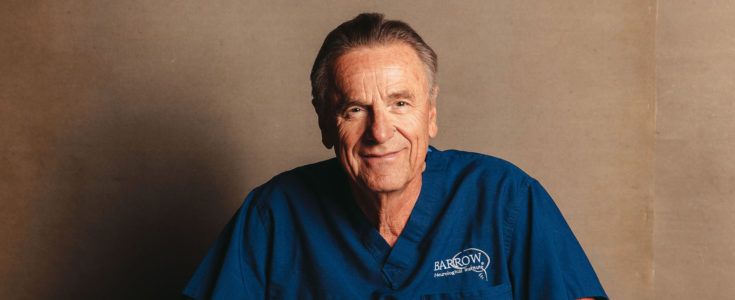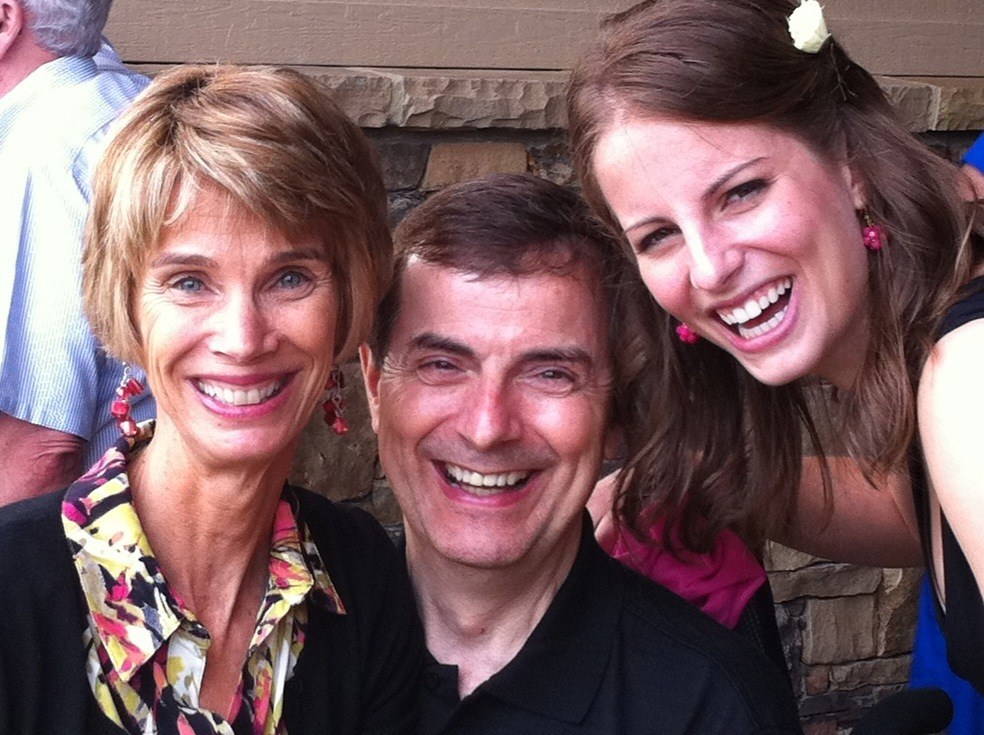
Ivy Blog
It’s Personal: Dr. Robert F. Spetzler
- February 12, 2021
- Ivy Center
- Posted in #ItsPersonal
- Comments: 5

In 1949, five-year-old Robert Spetzler found himself standing in an auditorium wearing nothing but a hospital gown faced with hundreds of men in white lab coats. They were all curious to see the accomplishment of the doctor who had saved his life with penicillin, a relatively new drug at the time. The doctor removed Robert’s hospital gown to reveal his recovered reflexes but, in the process, stripped that five-year-old boy of every ounce of dignity he possessed.
Childhood experience shapes legendary career
Seventy years later, a world-renowned expert in the management of cerebrovascular disorders and difficult brain tumors, Robert F. Spetzler, MD recalls this childhood experience as the point that indirectly led him into medicine. “Even to this day, I shudder at that memory and trust that it gave me a lesson that I have repaid to my patients, trying to keep in mind that for them this is a brand-new experience. They don’t see this day in and day out and maybe treat them with a little more respect and dignity than I had received.”
The Robert F. Spetzler Neuroscience Tower in Phoenix, AZ proudly bears the name for the president chairman Emeritus of Barrow Neurological Institute. Amongst his numerous accomplishments, Dr. Spetzler spends much of his time teaching incoming residents the techniques he has pioneered. Dr. Spetzler says, “One thing that is incredibly rewarding about my job, and the pinnacle of what medicine is really all about, is the ability to take care of patients, to give them your very, very best. And that sort of goes right back into the second portion, which is teaching. To have a role in the education of all these young, incredibly talented men and women that are aspiring to become neurosurgeons.”
When one phone call makes it all personal

In 2013, after nearly four decades of helping other patients and their families overcome some of the most difficult neurological diseases, Dr. Spetzler received a phone call that his brother’s wife, Clarine, was in the emergency room. “The CT scan showed a brain tumor, and she was deteriorating rapidly right in front of his eyes,” recalls Dr. Spetzler. Once Clarine was stabilized, she underwent surgery to have the tumor removed and it was discovered to be glioblastoma, the most aggressive form of brain cancer. “She was treated with all the adjuvant therapy that is available, radiation, chemotherapy. She far exceeded her life expectancy and had three good years when the tumor returned and took her life.”
As Dr. Spetzler recounts his sister-in-law’s journey, he explains the frustration that comes with treating this deadly disease. “Glioblastoma is one of those incredible challenges for our specialty and for the neuro-oncologists and researchers to make improvements.” He continues by emphasizing the importance of clinical trials and the avenues of hope they can provide. “By participating in a trial, not only are you getting the potential benefit of that extra treatment, but you’re helping further the knowledge, and that’s really how improvements and solutions are created.”
Discovering hope for glioblastoma through innovative research
Barrow Neurological Institute is home to the Ivy Brain Tumor Center, the largest Phase 0 clinical trials program for brain tumors in the country. “Dr. Nader Sanai came up with this very clever way of Phase 0 trials, which instead of going through a trial and then finding that you had absolutely no benefit, it really goes through the trial with various steps of checking to see whether there’s potentially a benefit or no benefit. It’s a stop-and-go sequence, which I think has the potential of giving us beneficial results much quicker and avoiding the incredible costly trials that try to seek the same answer,” Dr. Spetzler explains.
As Dr. Spetzler reflects on his personal experiences, he believes all of life’s circumstances have cultivated the empathy he now carries as a doctor and the hope he imparts to each and every patient.
“Hope is an incredibly important part of the human spirit, and our job, when we speak to a patient, is to give hope in realistic terms. It is wrong to give false hope, but it’s also cruel to take away hope when hope is present.”
Have you been personally impacted by brain cancer? We welcome you to share your story on social media using the hashtag #itspersonal and tag the Ivy Brain Tumor Center. We will share as many as we can to support this movement as we work to build awareness and help those suffering from glioblastoma and other aggressive brain tumors.
Click here to learn more about why the fight against brain cancer is personal to the team at the Ivy Center.
For more information about our Phase 0 clinical trials, please contact an Ivy Navigator at 602-406-8605 or submit a trials screening request here.

5 Replies to “It’s Personal: Dr. Robert F. Spetzler”
Susan Wines. (mother)
My son was diagnosed with this June 25th 2020, he passed away January 15th 20 21 He had chemo radiation and a boatload of steroids. He also had seizures, a stroke, blood clots and an infection in the bone. He had surgery but they couldn’t get it all. He was treated at Johns Hopkins.
Ivy Center
We’re so sorry to hear about your son, Susan. This is truly a devastating disease. We are committed to accelerating the discovery of new, effective therapies for this patient population.
mjs
Doctor Spetzler is cool.
julia M Edwards
My Son was only 14 when he was diagnosed with Glioblastoma back in 2015. He had 3 surgeries and a bout of radiation and steriods and gained a lot of weight. He had a stroke the last surgery which left him paralysed on his right side. He passes away in May of 2017at 16 because the cancer had grown so much and spread thorough out his brain stem. He was treated at Children’s Heathcare of Atlanta. This is such a terrible disease..
Ivy Center
We are so sorry for your loss and we appreciate you sharing your personal connection with us. This is a devastating disease and our team is working tirelessly to find a cure.
Comments are closed.